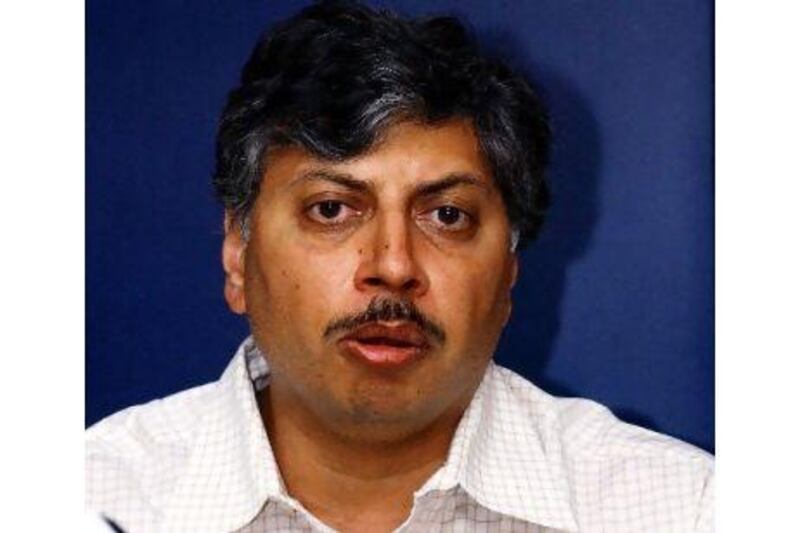In 1981, four brash young men left their jobs with Patni Computer Systems to start Infosys, which gradually grew to become one of India's largest and perhaps the country's best-known IT company.
A decade later, in 1992, Infosys's annual revenue languished at US$2 million (Dh7.34m). It was then that co-founder Nandan Nilekani hired a bright young graduate to help drive up the numbers.
That employee was Phaneesh Murthy and over the next 10 years, he pushed revenue up to $700m. A star within the company, he was known as "the other Murthy", an allusion to the charismatic founder NR Narayana Murthy.
Then Phaneesh Murthy's career at Infosys blew up under the cloud of a sexual harassment lawsuit, which Infosys settled out of court. He denied the allegations and his wife stood by him. But Mr Murthy left the company in 2002 and soon after founded Quintant, a business process outsourcing company later acquired by iGate, where he is now the chief executive.
Fast-forward another decade and Mr Murthy has claimed the company where, arguably, the Indian IT story began. Last week iGate acquired Patni Computers, the firm where Infosys's founders began their careers, for $1.22 billion (Dh4.48bn), making this the largest takeover in the Indian IT business, larger than Oracle's acquisition of i-flex in 2005 and EDS's acquisition of MphasiS in 2006.
It is a messy deal, complicated by the emotional connection that the three Patni brothers who started the firm that has their name have with the company they founded. IGate, along with the private-equity firm Apax Partners, bought the 45.6 per cent of the equity held by the Patni brothers and the 17.4 per cent stake held by General Atlantic, for $921 million. Under Indian law, iGate also has to acquire 20 per cent from the public shareholders at the same price, driving up the cost of the deal to approximately $1.22bn. To finance the acquisition, iGate negotiated a $700m bridging loan from RBC Capital Markets.
The deal allows Mr Murthy, a graduate of the elite Indian Institute of Technology and the Indian Institute of Management, to claim his place among the big players of the country's IT industry. For a chief executive to fall from grace in any situation is tough; but to have done so because of something that had nothing to do with his core competence is especially hard. Everyone I spoke to agreed that Mr Murthy was one of the best and the brightest in the Indian IT business. A born leader, one said. Someone who could deliver the numbers, another said. A victim of bad luck, said a third.
Who is the real Phaneesh Murthy?
I e-mailed him cold, asking for a 15-minute telephone interview. Within half an hour he e-mailed back, saying he would call, and within an hour I was talking to him.
Mr Murthy's voice has the cadences of the south Indian Brahmin that he is. He speaks warily to the press. What the deal gives the combined 25,000 employees of the iGate and Patni companies, he says, is the ability "to operate quickly in multiple verticals and have solutions in multiple verticals. It allows us to reach a billion dollars in a short time, so that you are just an order of magnitude away from the big players."
Pulling off the deal took a certain amount of hand-holding. Patni Computers has been on the block for about four years, ever since the three founding brothers indicated that they wanted to get rid of it.
Several companies including the private-equity funds Advent and Carlyle, as well as the Japanese IT giant NTT, tried to buy the company, which holds a prime place in the history of the Indian software industry, but the price or the timing or the fit was never right.
Meanwhile, Mr Murthy convinced his board that the only way to achieve its stated target of becoming a billion-dollar enterprise by next year was through acquisitions. IGate tried to buy the beleaguered Satyam Computers before losing out to Mahindra.
This time, Mr Murthy had to deal with a sceptical board and a shortfall of cash, and he had to mediate between brothers who were emotionally attached to their company. "You have to empathise with people who are doing a deal after 32 years of starting a company," he says. "It is an emotional decision for the founders of Patni."
From iGate and Mr Murthy's point of view, the hardest part was getting "committed financing."
I put to him the question that has been nagging me. Is it personal, I ask? Is it a way to get even with his erstwhile colleagues at Infosys? He sighs. "Everyone says that M&As are about ego," he replies. "I've been a salesperson for 10 years. For every 100 doors that you knock on, 98 get shut in your face. That has knocked away most of my ego. I have two teenage boys who whip my butt in every game. They have gone from wanting to be on my team to not wanting to be on the loser's team. Because of that, I have no ego left."
What would you tell the other Murthy, the man who founded the company, if you ran into him in the corridor? I ask. "Depends on what he tells me," he replies. "I have a great deal of respect for him. If he says congratulations, I will say thank you. If he asks me about the deal, I will tell him how it is structured. It all depends."
And now, Phaneesh Murthy must get back to work.





